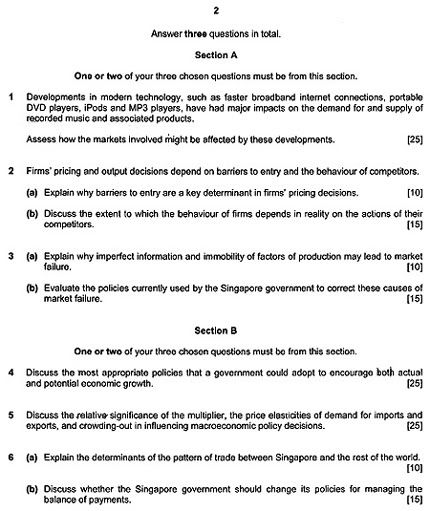Thursday, November 27, 2008
Wednesday, November 12, 2008
2008 'A' Level Paper 2 Questions

Imperfect information and market failure
Both consumers and producers require complete information if they are to make efficient choices and decisions about what to buy and what to supply to the market.
Information failure occurs when people have inaccurate, incomplete, uncertain or misunderstood data and so make potentially ‘wrong’ choices. Sources include:
- Consumers do not have adequate technical knowledge
- Advertising can mislead or mis-inform
- Producers unaware of all opportunities
- Producers cannot accurately measure productivity
- Decisions often based on past experience rather than future knowledge
| Merit goods | Demerit goods |
| Goods that society values and judges that everyone should have whether the individual wants them or not. | Goods that society values and judges to be bad for and individual |
| Underconsumed due to imperfect information – individuals are unaware of long-term benefits and positive externalities | Overconsumed due to imperfect information – individuals are unaware of long-term detriments and negative externalities |
| Consumption of merit goods is believed to generate positive externalities ( | Consumption of demerit goods leads to a fall in social welfare (MPB exceeds |
| Healthcare, education, public libraries | Alcohol, cigarettes, drugs, addiction to gambling |
Merit goods provide positive externalities but if left wholly to the private sector, it is likely that merit goods will be under-consumed because individuals do not understand or appreciate the social benefits that can result from consumption of education and health services to name just two examples.
The argument concerning imperfect information is an important one. Parents with relatively poor educational qualifications may be unaware of the full longer-term benefits that their children might derive from a proper education.
Because the knowledge of these private benefits is an ongoing learning process, children themselves will tend to underestimate the long term gains from a proper education. Education is a long-term investment decision. The private costs must be paid now but the private benefits (including higher earnings potential over one’s working life) take time to emerge.
Factor immobility may be due to:
- Occupational immobility – this occurs when there are barriers of mobility between different jobs and different industries
- Geographical immobility exists when there are barriers to people of moving to different locations
Occupational immobility occurs when there are barriers to the mobility of factors of production between different industries and occupations. This can lead to people remaining unemployed, or being used in ways that are not economically efficient. Land and Capital: Some capital inputs are occupationally mobile - a computer can be put to productive use in many different industries. Commercial buildings can be altered to provide a base for many businesses. However some units of capital are specific to the industry they have been designed for.
Labour as a factor of production often experiences occupational immobility. For example, workers made redundant in the sheet metal industry may possess job-specific skills that are not necessarily transferable to the growing industries in the economy. This implies that there is a mismatch between the skills on offer from the unemployed and those required by employers looking for extra workers. This is also called structural unemployment and is a major reason why there is a core of workers in the UK who find it difficult to find paid work. Clearly this leads to a waste of scarce resources and represents market failure - because social welfare is not being maximised.
Geographical immobility
There are good reasons why geographical immobility might exist:
- Family and other social ties
- Costs involved in moving home
- Regional variations in house prices
- Differences in the general cost of living between regions
Policies to Improve Mobility of Labour
To reduce occupational immobility the government might: Invest in increased provision of training schemes for the unemployed - particularly those workers experiencing structural unemployment. An example of such an active labour market policy is the New Deal : subsidise the provision of industrial training by private sector firms either through grant assistance or through tax relief . Raise total spending on education and move towards increased investment in vocational training for students
To reduce geographical immobility the government or appointed agencies might introduce reforms to the housing market designed to improve the supply and reduce the cost of rented properties. Another option is to offer specific subsidies for people moving into areas where there are shortages of labour
Thursday, November 06, 2008
3 Tips for Your Final Push towards an 'A' in Econs!!
- Time management! Don't spend an excessive amount of time on any single question (whether it is essay or case study). Allocate your time according to the mark weightage (Essay - 10m (16mins) & 15m (24mins); Case Study - about 2 mins per mark). REMEMBER: THE MORE MARKS, OBVIOUSLY THE MORE TIME YOU NEED (likely to be a question expecting a higher level of response, e.g. evaluation-type question - in a case study, the last qn is usually an 8 to 10m qn - give yourself enough time to plan out a proper answer!)
- Answer the Question! Answer the question that is ASKED, not what you IMAGINE the question to be asking. The WORST answers are those that reveal that you are merely trying to FORCE-FIT a pre-prepared answer to the question! You need to spend at least 2 minutes of your time examining the question carefully, both for the content needed (i.e. topic coverage, context (industry, economy, time frame (last 5 years, recent), scope) and the skills tested (i.e. Application, Analysis or Evaluation - look at command word!). Then plan an answer (at least another 3 minutes) that is able to ADDRESS THE QUESTION! Answer the question DIRECTLY and CLEARLY - REMEMBER: DO NOT MAKE YOUR EXAMINER SEARCH FOR YOUR ANSWER!
- Impress the Examiner!!
- Display the skills of Application, Analysis and Evaluation as required!
- Application - e.g. not just showing you have knowledge about Singapore ("Singapore is an export-oriented, imported dependent country"..) but actually applying to Singapore ("Since Singapore is an export-oriented, imported dependent country, a change in ER will have a significant impact on the economy....") - SEE THE DIFFERENCE??
- Analysis - Accuracy, Detail .... Make reference to well-drawn diagrams to support your explanation!
- Evaluation - Show that you have given thought to the answer!! Consider limitations, assumptions, the circumstances or situations considered, time frame, etc!! SUPPORT your evaluation with GOOD ANALYSIS!
- Begin each paragraph with a topic sentence that gives the reader an idea of what the paragraph is going to be about.
- The supporting sentences need to be about the idea presented in the topic sentence. Do not digress or ramble. Write sufficiently but do not ramble.

